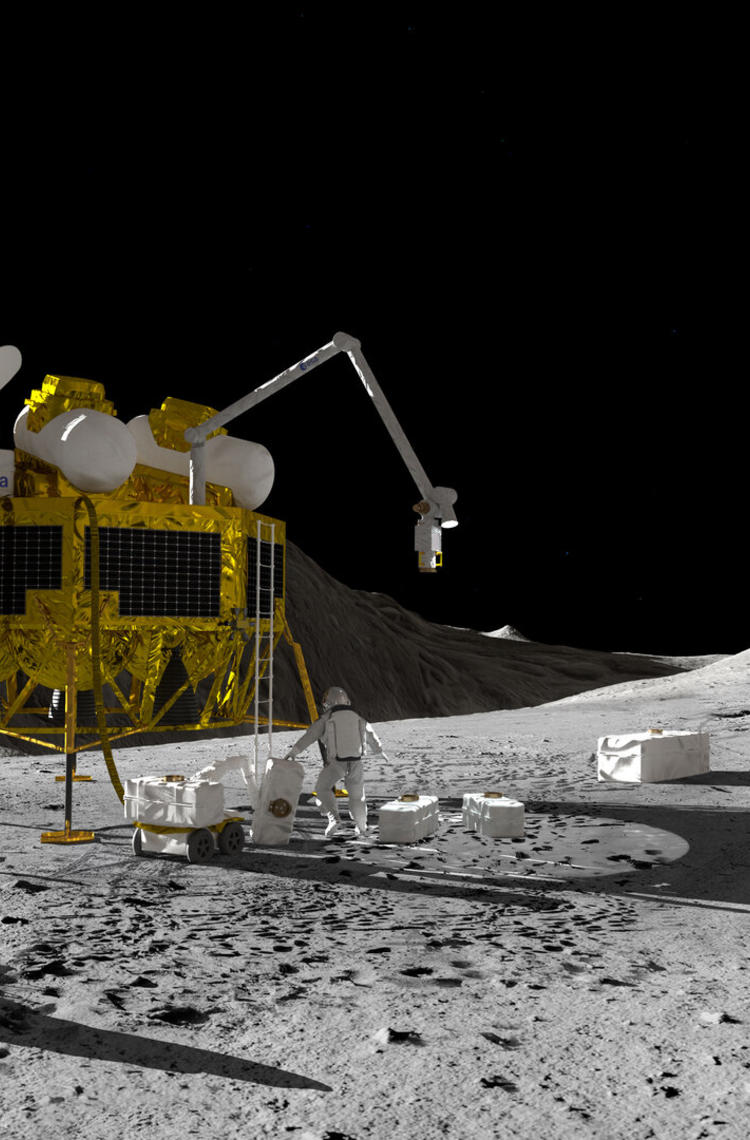The Moon Camp Challenge is an educational competition run in collaboration between the European Space Agency (ESA) and the Airbus Foundation, in partnership with software company Autodesk. It challenges students to design their own Moon settlement using a 3D modelling tool, and features complementary classroom activities that focus on learning by-design and science experimentation.
Teams have to design their Moon Camp, which should be adapted to the Moon environment, consider the use of local resources, provide shelter, and accommodate living and working facilities for the astronauts.
This year's Moon Camp Challenge saw 5,354 students from 39 countries take up the challenge to design this vision of life on the Moon. Inspiring entries were received from all over the world. These young visionaries unleashed their creativity, crafting unique lunar habitation concepts and bringing them to life with 3D design tools.
The Moon Camp Challenge jury – an expert panel of ESA and Airbus Foundation professionals in the fields of lunar exploration, 3D design, and space technology – were blown away by the impressive quality of the students’ projects.
The European Space Agency, Airbus Foundation and Autodesk are delighted to announce the winning projects of the Moon Camp Challenge 2022-2023. To learn more about the three categories within the Moon Camp Challenge, read more here: https://www.esa.int/Education/Moon_Camp/Moon_Base_Marvels_Celebrating_the_winners_of_the_2022-23_Moon_Camp_Challenge
The jury members had the difficult task of selecting the three best entries from both ESA Member States and non-ESA Member States in the Moon Camp Explorers and Moon Camp Pioneers categories. All entries were judged on their creativity and innovation, feasibility, 3D design quality, and how well the design was suited to the lunar environment.
Moon Camp Pioneers
For the advanced Moon Camp Pioneers category, 171 teams involving 954 students across 23 countries designed a complete Moon base using the complex 3D design tool Fusion 360, or another tool of their choice. Teams found innovative ways to make a sustainable Moon Camp fit for commercial or scientific use, or even tourism, and considered what kind of vehicles they would need to cross the lunar surface.
Moon Camp designs by team Twinkler, and by team MRLB, 1st places for Moon Camp Pioneers
Moon Camp Explorers
For the intermediate Moon Camp Explorers category, 1,069 students from 313 teams across 27 countries designed a complete Moon base using Tinkercad. They were challenged to think about the technical aspects of their design, such as resource management, protection and sustainability, as well as how they would train their astronauts for a mission to the Moon.
Moon Camp designs by team Shining Stars and by team Cserepka Trio, 1st places for Moon Camp Explorers
Moon Camp Discovery
Moon Camp Discovery, the non-competitive category for 3D design beginners, saw the participation of 2,674 students from 1,429 teams across 28 countries. This year’s submissions included a wonderful array of 3D designed lunar camps, rockets, lunar landers, lunar rovers, orbital space stations and space suits, created using Tinkercad.
Moon Camp @School
This year also saw the first ever submission of projects for the Moon Camp @School category. Students and educators shared their incredible school projects, which included creating robotic arms and rovers, writing graphic novels, crafting cardboard lunar camps, and designing solar ovens. @School saw the participation of 657 students from 142 teams across 16 countries.
Congratulations
The teams that have won 1st place will receive a 3D printer, offered by the Airbus Foundation. All the winning teams will get the chance to chat with an ESA astronaut in the Moon Camp webinar and receive ESA goodies.
The ESA, Airbus Foundation and Autodesk would like to congratulate all of the teams that completed the Moon Camp Challenge this year on their great work, and would like to thank all the teachers, parents and mentors who supported the students along the way. Well done!




